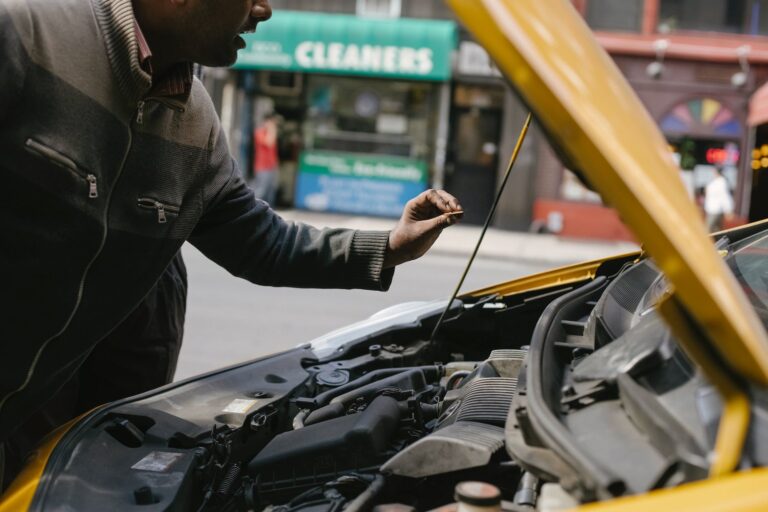Understanding Brake Fluid Leaks
Brake fluid is an integral component of a vehicle’s braking system, playing a crucial role in transferring movement and force from the brake pedal to the brake components. Understanding the importance of brake fluid and recognizing the signs of a brake fluid leak are essential for maintaining the safety and functionality of your vehicle.
The Importance of Brake Fluid
Brake fluid is a hydraulic fluid that operates under high pressure to transmit force and amplify the braking power when the brake pedal is pressed. It serves as a medium to transfer the force from the pedal to the brake system components, such as the brake calipers or wheel cylinders. Without an adequate amount of brake fluid, your vehicle’s braking system would not be able to function properly, compromising your ability to stop safely.
Regularly checking and maintaining the proper level and quality of brake fluid is crucial to ensure optimal brake performance. Contaminated or deteriorated brake fluid can lead to diminished braking efficiency and potentially compromise your safety on the road. To learn more about brake fluid leaks and their causes, you can visit our article on brake service near me.
Signs of a Brake Fluid Leak
Identifying the signs of a brake fluid leak is vital in preventing potential brake system failures. Here are some common indicators that may suggest a brake fluid leak:
-
Low Brake Fluid Level: One of the most apparent signs is a sudden decrease in the brake fluid level in the master cylinder reservoir. If you notice that the fluid level is consistently low, it may indicate a leak somewhere in the system.
-
Fluid Puddles or Stains: If you notice puddles or stains of a clear or slightly yellowish fluid beneath your vehicle, it could be an indication of a brake fluid leak. These puddles are commonly found near the wheels or beneath the master cylinder.
-
Soft or Spongy Brake Pedal: A brake fluid leak can lead to a loss of hydraulic pressure, resulting in a soft or spongy brake pedal feel. If you find that your brake pedal requires more effort to engage or has a noticeable decrease in responsiveness, it may be due to a brake fluid leak.
If you encounter any of these signs, it is crucial to address the issue promptly to prevent further damage to your vehicle’s braking system. Seeking professional assistance from a trusted brake repair shop, such as brake mechanic, is recommended to diagnose and address the underlying cause of the brake fluid leak. Delaying repairs can lead to more severe consequences, such as a loss of brake pressure, reduced braking efficiency, or potential brake failure.
By understanding the importance of brake fluid and being aware of the signs of a brake fluid leak, you can take the necessary steps to ensure the safety and reliability of your vehicle’s braking system. Regular brake inspections, brake fluid flushes, and maintenance are essential to detect and address any potential issues before they escalate.
Causes of Brake Fluid Leaks
Brake fluid leaks can occur due to various factors, compromising the integrity of the braking system. It is crucial to identify and address these causes promptly to ensure proper brake function and safety. Let’s explore some common causes of brake fluid leaks.
Damaged Brake Lines
One of the primary causes of brake fluid leaks is damaged brake lines. Brake lines can become damaged due to wear and tear, corrosion, or improper installation (Fleet Maintenance). Over time, exposure to harsh road conditions and environmental elements can lead to weakened or perforated brake lines, allowing brake fluid to escape.
Corroded Brake Calipers
Corroded brake calipers can also be a source of brake fluid leaks. Corrosion can compromise the integrity of the caliper housing, causing cracks or holes to develop (Fleet Maintenance). This corrosion can occur due to exposure to moisture, road salt, or other corrosive substances. The weakened caliper housing can result in brake fluid leakage, jeopardizing the braking system’s effectiveness.
Leaking Wheel Cylinders
Another potential cause of brake fluid leaks is leaking wheel cylinders. Wheel cylinders play a crucial role in the operation of drum brakes. Over time, the seals within the wheel cylinders can wear out or become damaged, leading to fluid leakage (Fleet Maintenance). This can compromise the brake’s hydraulic pressure and result in reduced braking performance.
Faulty Master Cylinder
The master cylinder is a crucial component of the braking system, responsible for generating hydraulic pressure that enables the brakes to function effectively. A faulty master cylinder can also be a cause of brake fluid leaks (HowStuffWorks). Internal seals within the master cylinder can deteriorate over time, leading to fluid leaks. This can result in a loss of brake pressure and potentially compromise the entire braking system.
Identifying the specific cause of a brake fluid leak requires a thorough inspection by a qualified professional. If you suspect a brake fluid leak in your vehicle, it is crucial to have it examined and repaired promptly by a reputable brake repair shop. Delaying repairs can lead to further damage to the braking system and compromise your safety on the road.
In the next section, we will explore the potential consequences of brake fluid leaks, highlighting the importance of addressing these issues promptly.
Consequences of Brake Fluid Leaks
When it comes to brake fluid leaks, the consequences can be severe. It is crucial to address these leaks promptly to ensure the safety and functionality of your vehicle’s braking system. Here are some of the potential consequences of brake fluid leaks:
Loss of Brake Pressure
A brake fluid leak can result in a loss of brake pressure, compromising the effectiveness of your braking system. Brake fluid plays a vital role in transmitting the force from the brake pedal to the brake components, allowing you to slow down or stop the vehicle. When there is a leak in the brake system, the hydraulic pressure necessary for proper brake operation is reduced. As a result, you may notice a spongy or unresponsive brake pedal and a decrease in overall braking performance. It is crucial to have this issue addressed immediately by a qualified professional to restore the proper function of your brakes.
Reduced Braking Efficiency
One of the direct consequences of a brake fluid leak is reduced braking efficiency. When brake fluid is leaking from the system, it means there is a decrease in the amount of fluid available for the braking components to operate optimally. As a result, your vehicle’s ability to slow down or stop efficiently may be compromised. This can lead to longer stopping distances, increased risk of accidents, and diminished control over your vehicle. If you notice any signs of reduced braking efficiency, such as a longer pedal travel or difficulty in bringing the vehicle to a complete stop, it is essential to have your brake system inspected and repaired promptly.
Potential Brake Failure
Perhaps the most serious consequence of a brake fluid leak is the potential for brake failure. If the leak is not addressed, it can worsen over time and cause a complete loss of hydraulic pressure in the braking system. Without hydraulic pressure, the brakes will not engage properly, making it extremely difficult to stop the vehicle. Brake failure is a dangerous situation that puts you, your passengers, and other road users at significant risk. If you experience a sudden loss of braking power or notice any signs of brake fluid leaks, it is crucial to stop driving the vehicle immediately and seek professional assistance.
To ensure your safety on the road, it is important to recognize the signs of a brake fluid leak, such as a spongy brake pedal, reduced brake performance, a puddle of fluid under the vehicle, a lit brake warning light, or dropping fluid levels. If you notice any of these signs, it is essential to have your brake system inspected and repaired by a qualified professional. Addressing brake fluid leaks promptly can help prevent further damage to your braking system and ensure the reliable operation of your vehicle’s brakes.
Remember, regular maintenance and inspections of your brake system are crucial to detect and address any potential issues. If you need professional brake services, such as brake repair or brake fluid flush, be sure to consult a reputable brake service near you. Your safety on the road depends on the proper functioning of your brakes, so don’t delay in addressing brake fluid leaks or any other brake-related concerns.
Diagnosing and Addressing Brake Fluid Leaks
When it comes to brake fluid leaks, prompt diagnosis and repair are crucial to ensure the safety and performance of your vehicle’s braking system. In this section, we will explore three important steps in dealing with brake fluid leaks: checking brake fluid levels, identifying leak locations, and seeking professional inspection and repair.
Checking Brake Fluid Levels
Regularly checking your vehicle’s brake fluid levels is an important part of brake system maintenance. Brake fluid levels can gradually decrease over time due to normal wear and tear, but a sudden drop in fluid level indicates a potential leak that requires immediate attention (Brembo Store USA).
To check the brake fluid levels, locate the brake fluid reservoir, which is generally located near the master cylinder. The reservoir should have a minimum and maximum level indicator. Ensure that the fluid level is within the recommended range. If the level is below the minimum mark or significantly lower than before, it is an indication of a possible brake fluid leak (Wagner Brake).
Identifying Leak Locations
Identifying the location of the brake fluid leak is essential for effective repair. Signs of a brake fluid leak may include loss of brake performance, a spongy-feeling brake pedal, a puddle under the car, a lit brake light, or dropping fluid levels (nubrakes.com). If you suspect a major brake fluid leak or experience sudden changes in pedal performance, it is important to pull off to a safe area and inspect the vehicle or call a professional.
Start by visually inspecting the brake lines, calipers, and wheel cylinders for signs of leakage. Look for wet or oily spots, dampness, or visible fluid stains. Pay close attention to areas where the brake lines connect to the calipers or wheel cylinders, as these are common areas for leaks to occur (HowStuffWorks).
Professional Inspection and Repair
While you may be able to identify the general location of a brake fluid leak, it is recommended to seek professional inspection and repair. A trained brake mechanic has the expertise and specialized tools to diagnose the exact cause of the leak and provide appropriate solutions.
When visiting a brake repair shop, inform the technician about your observations and any symptoms related to the brake fluid leak. They will perform a comprehensive inspection of the brake system, including the brake lines, calipers, wheel cylinders, and master cylinder. Based on their findings, they will recommend the necessary repairs or replacements to address the leak and restore the proper functioning of your brakes.
Remember, brake fluid leaks can compromise your vehicle’s safety and should not be ignored. Promptly addressing these issues with the help of a professional ensures the reliability and effectiveness of your braking system.
By regularly checking brake fluid levels, identifying the location of leaks, and seeking professional inspection and repair, you can maintain the integrity of your vehicle’s braking system and ensure your safety on the road.







